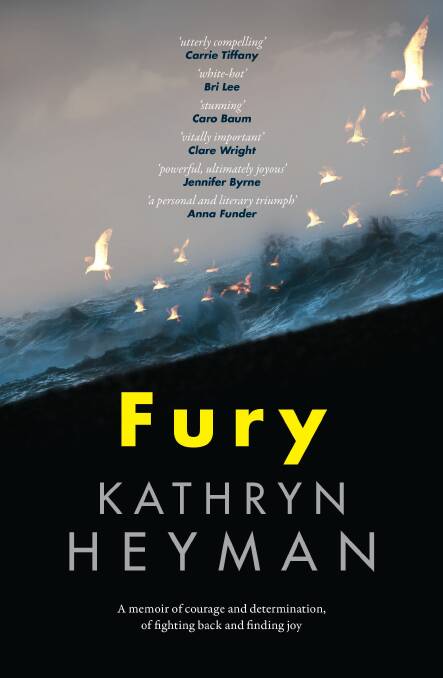
- Fury, by Kathryn Heyman. Allen & Unwin, $29.99.
Kathryn Heyman's memoir, Fury, tells the story of her recovery from the abuse she suffered as a young woman. It is set in a world where men do not treat women as they should. It is our world. This world.
Subscribe now for unlimited access.
or signup to continue reading
Heyman's tale is one woman's story, but in many ways it is every woman's story.
That is not to say that all women experience the sexism and abuse that Heyman has weathered. Nor is it to say that all men are bad - Heyman also encountered some very good men during her journey. Rather, Fury is a cry of outrage that so little has changed in the past 40 years and that so many women still suffer.
Heyman, now in her 50s, was in her 20s as she strived to recover from sexual abuse and find her true self. Her struggles are the struggles of women today. The patterns and issues are the same. Why haven't we progressed?
Coming from a background of poverty, disadvantage and domestic violence, Heyman was largely alone as she tried to chart a path towards a more optimistic future. "There was no one to care for me, only myself, and I had never learned the lessons of caring."
She chose "men who were dangerous, failed to see the risks ... stumbled from one bad choice to another".
She endured a humiliating sexual abuse trial, in which it was she who seemed to be on trial, rather than the offender. "I am now, in this courtroom, ashamed to be the girl that I am, ashamed to be confronted with my own confusion."
She battled with the self-doubt that so many young women feel. "I tried to make myself the right shape ... I tried to be the kind of girl who fits, bending myself around the world, squeezing into corners."

She took risks, as all young women do. "Danger followed me, and perhaps I deserved it."
And things happened to her. Things that shouldn't happen to young women, but for which they are often judged as responsible.
Heyman explores her younger self with frankness and tenderness. She never makes excuses for her choices and she is genuine and unsparing in her self-analysis.
On behalf of all women, she probes deep. We feel her shame and uncertainty as a young woman. We fret over her self-destructive behaviour, the patterns that recur. We worry over the risks she takes, the unknown men she accepts lifts from when hitch-hiking. We are horrified by the way she is treated by uncaring young men, and at times, girls and other women.
It's clear that Heyman walked through some dark times in her earlier life, but she always carried her love of books and literature with her. This love of words was partly what saved her. Writing offered "a ladder of words" to another world that might take her "way past the sky, way above the moon", where "like a snake shedding its skin, there was nothing of my old self left".
The turning point for Heyman was when she took a job on a fishing trawler in the Timor Sea. Her experience on the Ocean Thief was hard and physical. It brought her close to the natural world, and it is here that Heyman's writing is at its most lyrical. "On those wild nights when the wind whipped the waves into a frenzy, we felt only freedom. Airborne, wind making a choral harmony outside. Flying was what it felt like ... sometimes, an osprey hovered above us, keeping perfect pace."
Heyman's time aboard the Ocean Thief triggered her to reflect on the events of her life and led to personal transformation. She revelled in the work and its unravelling exhaustion. But she didn't anticipate that this "would come with a stirring up of the past, a tearing up of memory".
Her memoir comes at a climax of societal anger and outrage at the treatment of women. Brittany Higgins, allegedly raped at Parliament House. Christine Holgate, scapegoated and dumped. A crisis in domestic violence. It goes on.
But women's voices are being increasingly heard. And Heyman's book is one more insistent voice, one more important story that adds to the clamour for change.
In the raw depiction of her journey, Heyman asks why abusive behaviour towards women is still tolerated. Why are women the ones held accountable? How can young women be themselves in this world without being raped, bashed, killed? How can we change the narrative?
Fury is a passionate and unflinching memoir, laden with metaphor, and filled with honesty, compassion and love. It portrays fragility, confusion and vulnerability. But, above all, it is an uplifting story of transformation and hope.
Beautifully written, honest and evocative, this is essential reading for both men and women.
- Karen Viggers is an author, veterinarian and feminist. Her latest novel is The Orchardist's Daughter.

